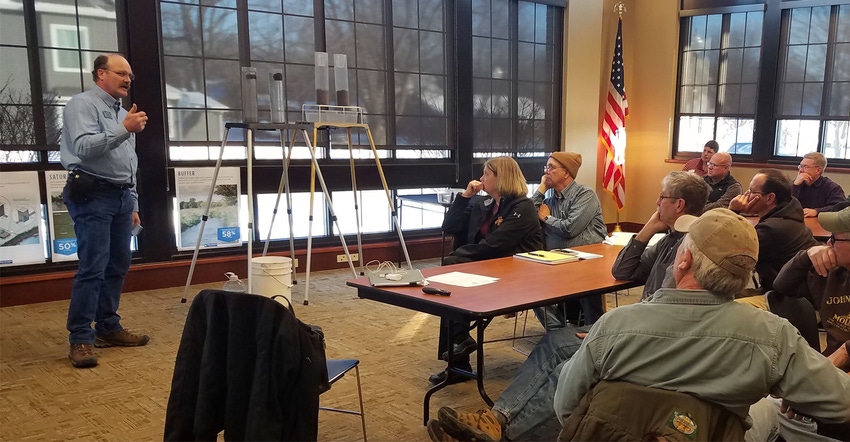June 3, 2019

Communication is key when working with stakeholders within a watershed to achieve goals, such as reducing flood risk and improving water quality, which are the focus of the Iowa Watershed Approach project.
The North Raccoon River Watershed is one of nine watersheds participating in the Iowa Watershed Approach, a statewide $96.9 million flood reduction and water quality improvement effort funded by the Department of Housing and Urban Development that began in 2016.
Connecting with landowners, farmers and other stakeholders in the watershed has been the goal of Marius Agua, the North Raccoon River Watershed project coordinator. With the help of local county and Iowa State University Extension specialists, Agua met with landowners to learn about their local drainage issues and discuss the project’s goals. He then held several roundtable discussions for people in the area to learn about the project.
Reaching out to farmers, landowners
After those discussions, Agua held “Farmer Forums,” where farmers and landowners could learn about soil health, economics and other topics related to the watershed management plan from experts. He plans to continue outreach efforts to reach more landowners and stakeholders in the watershed.
“This project is so exciting and challenging to me because a major component is the social component,” Agua says. “How are we able to successfully get communities to work together? Especially in this project where we have an upstream community, made up of farmers and landowners, and a downstream community, which is more urban and is impacted by flooding and water quality issues.”
The project is focused on getting landowners signed up to implement voluntary conservation practices, which are eligible for 90% cost share in key areas of the watershed, and creating a watershed management plan. Conservation efforts will include restoration of Swan Lake, as well as implementing other water-impounding practices on properties with willing landowners.
Flood control, water quality benefits
Agua believes there will be both flood reduction and water quality improvements seen as a result of the practices. “Water impoundment reduces flooding downstream and also induces anaerobic conditions, which are necessary to remove nitrate from water,” he explains.
Partners in the Iowa Watershed Approach include the Iowa Economic Development Authority; Homeland Security and Emergency Management; University of Iowa; Iowa State University; University of Northern Iowa; Iowa Department of Natural Resources; Iowa Department of Agriculture and Land Stewardship; cities of Coralville, Dubuque and Storm Lake; and Benton, Buena Vista, Fremont, Iowa, Johnson, Mills, Winneshiek and Howard counties.
For information about the North Raccoon River Watershed project or upcoming events, contact Marius Agua at 712-213-7459 or [email protected]. To learn more about the Iowa Watershed Approach project, visit iowawatershedapproach.org.
Source: ISU Extension, which is solely responsible for the information provided and is wholly owned by the source. Informa Business Media and all its subsidiaries are not responsible for any of the content contained in this information asset.
You May Also Like




